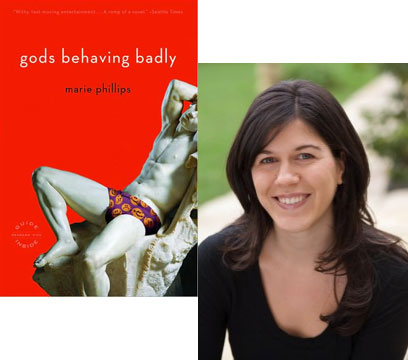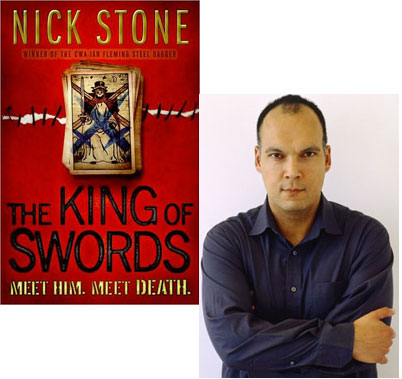Marie Phillips Goes Back to School & Rediscovers the Classics

One of the few episodes I remember from the 1980s revival of The Twilight Zone is a story called “Ye Gods,” and really the main thing I remember about it is that Robert Morse played the Greek god Cupid, wandering around the modern world shooting his arrows into yuppies. But the main idea has stuck with me over the decades, so when I first stumbled onto British novelist Marie Phillips’s debut, Gods Behaving Badly, I was eagerly to give it a try—and well rewarded for my curiosity, since it played right into my love of supernatural humor. (See, in this vein, the original Topper novels by Thorne Smith, or more recently Neil Gaiman’s Anansi Boys.) I’d wanted to meet Phillips, but her plans to visit the United States last year went awry—still, she was kind enough to send a short essay explaining the unusual circumstances behind her novel’s genesis.
I first got the idea for Gods Behaving Badly when I was working on a documentary being made on an American Air Force base in the U.K. I was only on set for a day or two, as a favour to a friend; her usual sound recordist couldn’t make it so she’d asked me to step in and help out. It was a fascinating, surreal place: a perfect slice of America on British soil. Everything was American, right down to the smallest detail; even the post-boxes were American, not our familiar red pillar-boxes. At certain times of day, the national anthem would play and everyone would stop what they were doing, put their hands on their hearts and bow their heads (this does not happen in many other places in the U.K.). The only way that you could tell you were still on British soil is that the imported American vehicles were being driven—by burly, heavily-armed American military personnel—on the left-hand side of the road.
My brief stint on the documentary involved recording the sound for footage taken in the on-base high school. To my British eyes it was like a school out of a American teen movie: the rows of brightly-coloured lockers, the cafeteria serving American food, the huge gym with its cheerleaders and posters for the homecoming dance, the kids in their letterman sweaters. I wonder whether being in a place that at once seemed so familiar, and yet so out of place on a flat plain in Cambridgeshire, woke up my creative juices, primed me to notice things that were out of the ordinary. Or maybe it was just luck.
In any case, we were filming in a philosophy class when inspiration struck. The teacher was explaining the differences between the gods of the ancient world—the Greek and Roman gods of mythology—and the modern Judeo-Christian God who we are more familiar with. The monotheistic God that we know, explained the teacher, is all-knowing, all-powerful, and good. The Greco-Roman gods were rather different. A huge, rambling family, locked in a constant power struggle against one another, they display character traits that we might recognise as far more human: vanity, jealousy, arrogance, anger, lust, revenge.
23 December 2008 | guest authors |
Nick Stone Comes Clean About His Miami Vice

John Scalzi’s Whatever blog has a recurring series of guest essays called “The Big Idea,” and earlier this week thriller writer Nick Stone showed up with an article about the storytelling properties of tarot, including his own experiences as a reader, although those experiences aren’t exactly why he ended up writing a novel called King of Swords. Now, when I first came across the book, I was curious as to why a British novelist was setting a suspense novel in 1981 Miami—I figured there must be some sort of connection there. And Stone was happy to fill me (and now you) in on the details behind the strange hold the city has on his imagination…
I’m English. I live in London. And I set my books in Miami.
Why?
Put simply, a place like Miami couldn’t exist in England. F. Scott Fitzgerald was wrong about there being no second acts in American lives. America is the country of comebacks. It may let its losers fall through the cracks and break into a million pieces, but it will always cheer and cherish the person who makes back it out of the abyss and reclaims the peak. Unfortunately, in England it’s the other way round. We like losers. We champion the underdog. Sure, this is as fair and as noble as a national trait can be. But there’s a flipside, a foul play to our fair play. What we really can’t stand is when our underdogs become top dogs. It reminds us of our failures, of the fact that those we so steadfastly supported are no longer like us. So we start planning their downfalls, hacking away at the pedestal. And boy do we like it when our heroes take that high dive back to Easy Street. Sure, they can always come back, but they never come back all the way. So Miami really couldn’t live in England, because it’s the city of second acts, the capital of comebacks, the place where people go to start again. Forget Vegas. Miami is for me and you. Miami is the place you start again, the scene of your second act.
I’ve been going there for close to thirty years. My mother and I used to overnight there on our way between England and Haiti. In 1981 we spent a couple of days. It was my first time in Miami Beach, and I’ll never quite forget the ride over the causeway, the way everything had an ethereal glow about it. From a distance was like a mirage. Only this one didn’t fade or disappear on me. It stayed.
19 December 2008 | guest authors |

 Our Endless and Proper Work is my new book with Belt Publishing about starting (and sticking to) a productive writing practice.
Our Endless and Proper Work is my new book with Belt Publishing about starting (and sticking to) a productive writing practice. 
